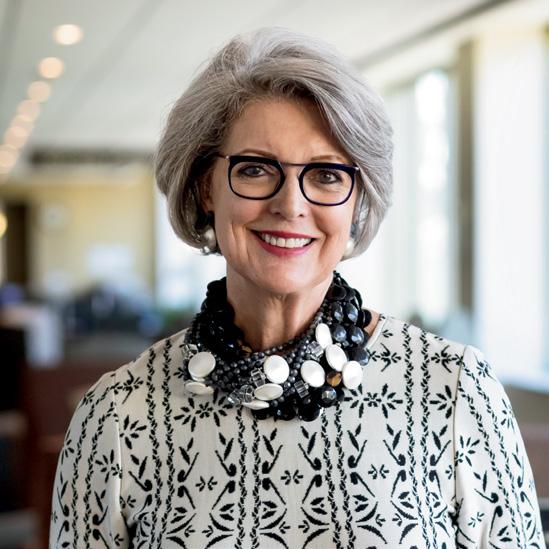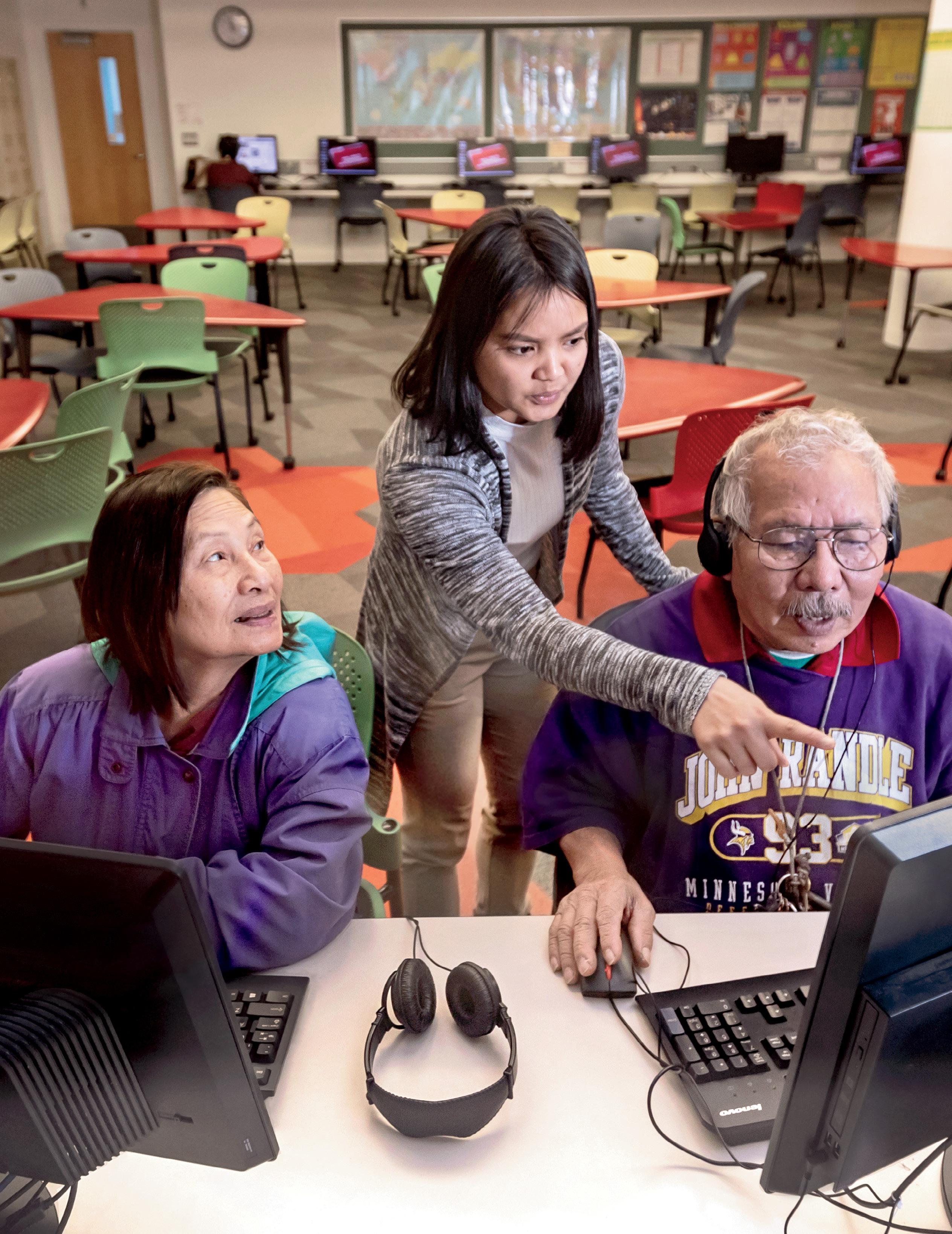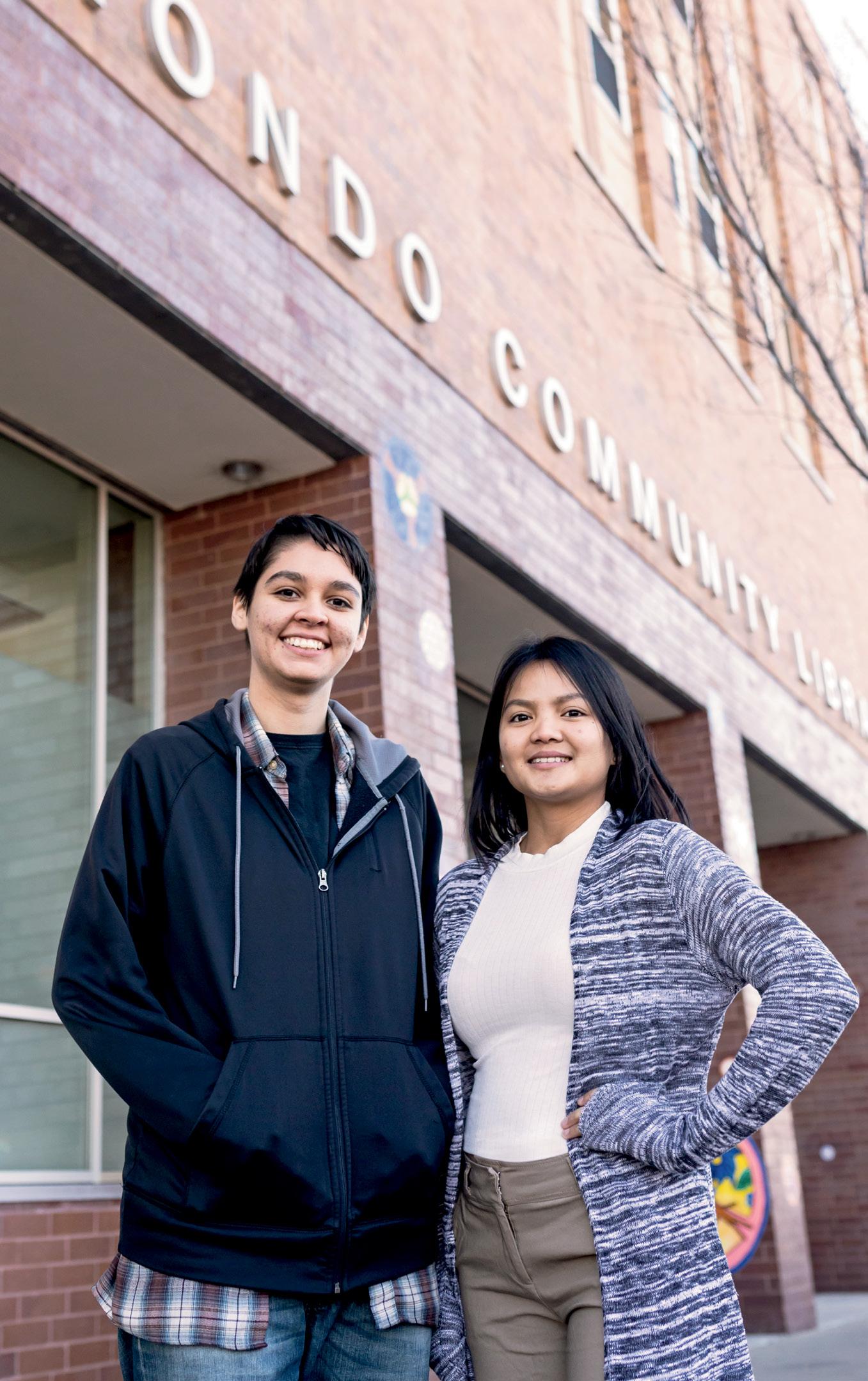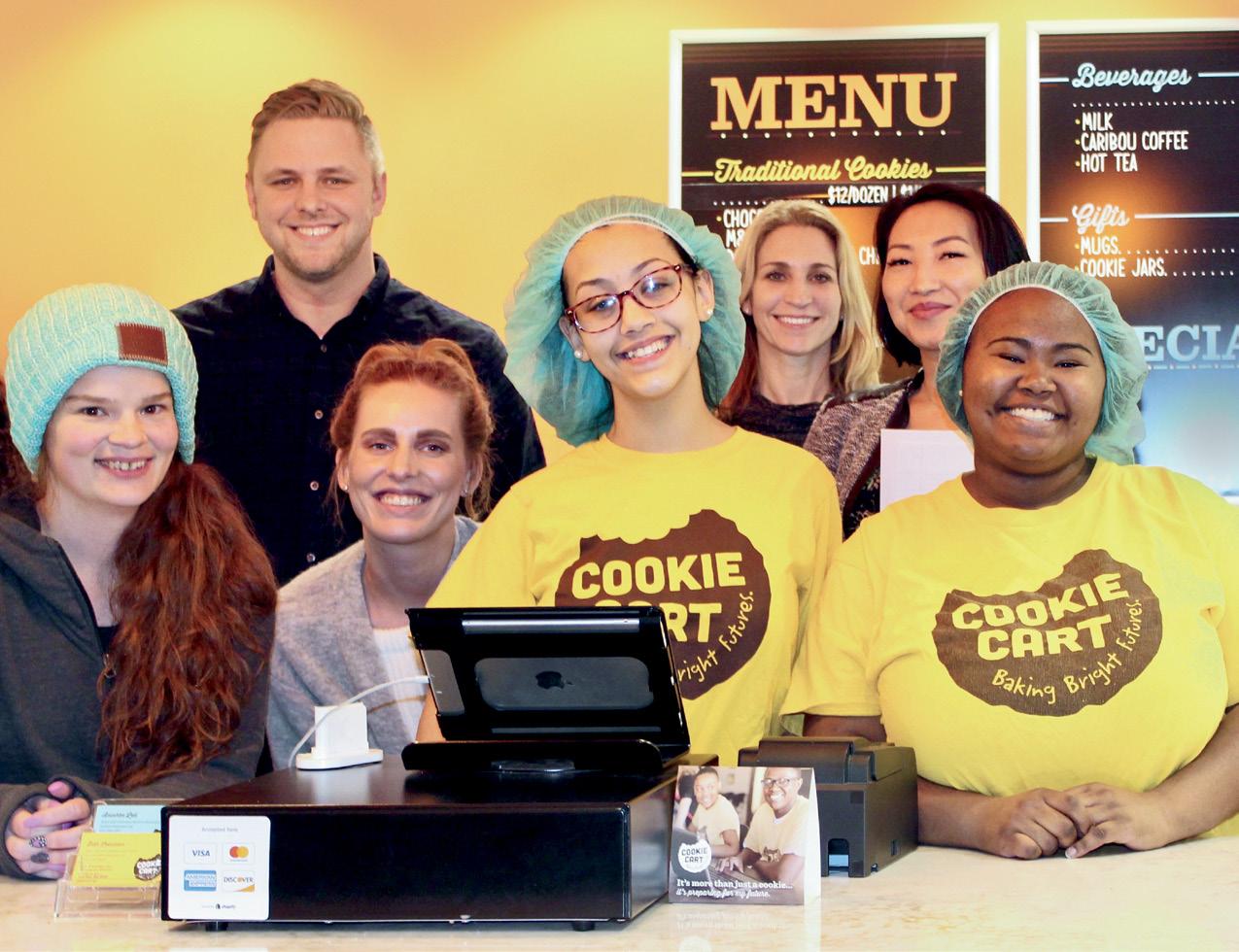
13 minute read
FROM THE PRESIDENT
But always to [Mother Antonia] St. Catherine’s had been a great college. Even when it was only a dream. Never just a building on a hill, it was a growing family of buildings... All of these she planned, built, and peopled in her mind long before the architects were ever summoned...
It is that vision for the future, that aspiration for excellence and the creative power to convert vision into reality that has distinguished Mother Antonia’s work in the entire field of education.
–Alice Promer ’38 June 1936 Ariston
Mother Antonia McHugh, CSJ (1873–1944) St. Catherine University’s first dean from 1914 to 1929 and first president from 1929 to 1937
From the President

Excellence. It is both an ethos and practice that has informed the past, present, and future of St. Catherine University.
St. Catherine was established as a premier institution for women’s education. As such, it was founded on a model of excellence that emulated the academic rigor found at prestigious universities of the time, such as the University of Chicago. Since then, St. Kate’s has continually evolved to meet the needs of students and the world, while keeping women, our Catholic heritage, and the liberal arts central to who we are.
Our growth began with earning full accreditation in 1917. In 1927, we began construction of Mendel Hall to be dedicated to the sciences — a radical idea for a women’s college at that time. Ten years later, we became the first Catholic institution in the United States to be awarded a Phi Beta Kappa chapter.
St. Kate’s continued to grow and evolve with the launch of the Weekend College in 1979, the first baccalaureate program in Minnesota for female nontraditional students, and merged with St. Mary’s Junior College in 1986 to link St. Kate’s to the oldest healthcare educator in the state. In 2009, we became a university, which recognized our breadth of degree and program offerings and increased our standing locally, regionally, and nationally. Today, we are the largest women’s private university in the nation, offering more than 90 programs at all degree levels.
Our history is proof of our ability as an institution to daily live our mission to lead and influence in a multitude of ways. St. Kate’s students engage in an education like no other because we do not settle for the status quo. Instead, we blaze new trails that continually set the education bar higher and deliver an academic experience that goes far beyond the classroom, as you will see highlighted in this issue. Each year, more than 1,600 students participate in service learning and internship programs that give them the opportunity to apply their in-class learning while building critical thinking, communication, and interpersonal skills (see page 4). Many of our students also engage in academic research with faculty, exploring topics that spark their passions, while solving complex problems and contributing to the greater good (see page 16).
Delivering this exemplary experience for students requires the dedication of our talented faculty, the compassion and hard work of our staff, the leadership of our trustees and administration, partnerships with community organizations and employers, and the support and generosity of our alumni and donors. Together, we carry forward the legacy of St. Kate’s to provide women with access to a high-quality, liberal arts education and ensure it remains accessible to women for generations to come. And as we start this new decade, I cannot wait to see the next level of excellence we create together.
ReBecca Koenig Roloff ’76

NAYNI PAUNG ’20 (CENTER), A PUBLIC HEALTH MAJOR, ASSISTS TWO PATRONS OF THE RONDO COMMUNITY LIBRARY DURING AN OPEN LAB SESSION. PAUNG IS EMPLOYED AT THE LIBRARY IN THE COMMUNITY LEADER PROGRAM THROUGH ST. KATE’S CENTER FOR COMMUNITY WORK AND LEARNING, ONE OF THE MANY SERVICE-LEARNING OPPORTUNITIES OFFERED TO STUDENTS.
Education Aff irmed Through Community Connection
St. Kate’s Center for Community Work and Learning connects students with Twin Cities organizations to enhance the academic experience.
BY MICHELLE MULLOWNEY ’17
Visit Rondo Community Library in St. Paul on nearly any day of the week and you might see a St. Kate’s student leading a community workshop for adults, a conversation circle for youth, or tutoring elementary age students. What you may not see is that these roles are actually a part of the St. Catherine University undergraduate or graduate curriculum, or possibly a paid position, and they appear throughout other libraries and organizations across the Twin Cities. Community-focused student employment and servicelearning opportunities are where critical inquiry skills meet tangible application within an often complex world.
Nayni Paung ’20, a public health major, works at both the Rondo Library and the George Latimer Central Library. She has a paid position through the Center for Community Work and Learning’s Community Leaders program, which also fulfills a capstone practicum. She helps facilitate Open Lab sessions, where she assists library patrons with a range of technology resources like email. But Paung also assists with some of life’s various challenges, such as identifying job opportunities or crafting résumés.
Watching her interact with Rondo patrons, you would hardly guess Paung calls herself shy. A semester’s worth of work in the Open Lab sessions has fostered both her self-confidence and her professional skills.
“This position has helped me work my way out of my comfort zone,” says Paung. “I’m able to connect this Community Work and Learning experience to the public health theories I learn in class and help patrons get access to health resources. Working with them builds my understanding of social determinants of health — such as physical environment, genetics, and coping skills — that can affect their well-being. I think it’s important that students have classes and hands-on experiences.”
Paung is also observing first-hand how powerful values like dedication and resilience can be. “There are times when a patron will come in to apply for a job, but doesn’t get hired, and you can see the frustration on their face. They may say, ‘I need to get this job now so I can provide for my family,’” Paung says. “The determination they show in coming back and applying again and again for different jobs is inspiring.”
Paung’s experience with Open Labs in the Saint Paul Public Library (SPPL) system demonstrates the symbiotic power of Community Work and Learning (CWL) at St. Catherine University. Each term, CWL matches hundreds of students with service-learning opportunities at organizations across the Twin Cities and facilitates meaningful community engagement through curricular service-learning and paid employment opportunities. Each project exemplifies the University’s
–NAYNI PAUNG ’20

mission framework instilled by the Sisters of St. Joseph of Carondelet, whose mission was to live and work within the community, not separate from it.
“St. Kate’s is part of the community. Because of our founding by the Sisters of St. Joseph, social justice is in our DNA,” explains D’Ann Urbaniak Lesch, director of the Center for Community Work and Learning. “We have the opportunity and the responsibility to be deeply involved. The more we can do that, the better it is for our students, our community, and the people who participate in our partner organizations. For us, it’s an opportunity to both learn from and work with them.”
And with eight years of partnership between SPPL and CWL, Paung is just one of many St. Kate’s students engaged in this reciprocal learning at the libraries. SPPL’s 13 locations are well situated to provide St. Kate’s students with opportunities to develop and practice their professional skills while supporting library programming for community members.
Manny Ibarra ’21, a psychology major, is also engaged in community work with SPPL. On any given Saturday, you can find him sitting in a circle among a group of children and teens. He leads their youth conversation circle, a welcoming place for young people to practice English among a supportive group of peers.
Ibarra chose conversation circles as a part of a required service-learning project for his Psychology Engages the World seminar course, but it is more than an opportunity to practice what he’s learning.
“It’s broadened my education,” Ibarra says. “My previous year at St. Kate’s, I felt very segmented between on- and off-campus. This year, it clicked that I’m actually taking my knowledge, skills, and everything I’ve learned in lectures out into the world.”
The growth experienced by students like Paung and Ibarra is something Wendy Neurer, volunteer coordinator for SPPL, has observed over the past eight years.
“The students are seeing in real time what works and what doesn’t,” Neurer says. “This experience gives them a kind of road map they didn’t have before. For example, Nayni [Paung] is working within the Open Lab framework and she’s learning what fits her professional style as she works with a diverse population.”
CURRICULUM INFUSED WITH SERVICE-LEARNING
Whether it’s a one-time collaboration or an ongoing internship, these community-oriented projects can vary widely in format and substance. Many students will complete at least one course with a service-learning component during their time at St. Kate’s as a part of University curriculum. It might be a weekly engagement, like Ibarra’s, or project-based, like a course taught by Sarah Rand, PhD, associate professor of business administration (pictured right).
Rand connects service-learning into her curriculum in the form of a new project each semester. She has her
Buyer Behavior and Market Research students develop an ongoing research project throughout the term to help a partner-organization solve a marketing need. For instance, in 2016, one of Rand’s student groups collaborated with the Arlington Hills Community Center, an SPPL location seeking support with their youth program.
For Rand, the quality of the connection between her marketing students and their SPPL project was tri-fold. “St. Kate’s mission is centered around social justice, and nonprofits are usually under-resourced and would love the opportunity to get help with marketing — plus, a lot of our students are interested in nonprofit work.”
In their partnership with the Community Center, Rand’s students focused on the center’s Createch Studio, a digital technology space for teenagers to create and learn. The group collected data through a survey asking how the studio’s teenage patrons were utilizing the space and how it could better serve them.
Lindsey Klein ’16, business administration alumna, was part of this group. Now a national sales representative at APi National Service Group, she credits the Createch Studio project with helping her develop valuable professional skills for her career. “You may picture these different scenarios in your head, but until you actually experience them you don’t know,” she says. “Critical thinking is such a big piece of it — looking at a set of data and putting together a solution. Being able to listen and understand a client’s business is a skill that I’ve definitely transferred over to my work at APi.”
Rand has observed that the skills developed by community-engaged students like Klein play key roles in their post-graduation opportunities. “Students can take this market research framework and transfer it to corporate in any way. And they see that,” she says. “Some alumni have come back and told me that their ability to understand and articulate their experience working on client research projects helped them get hired.”

LEFT: MANNY IBARRA ’21 AND NAYNI PAUNG ’20 STAND OUTSIDE THE RONDO LIBRARY. ABOVE: IN 2018, BUSINESS PROFESSOR SARAH RAND (BACK, CENTER) AND HER STUDENTS COLLABORATED WITH COOKIE CART, A NONPROFIT, ON ITS MARKETING PLAN AS A PART OF A SERVICE-LEARNING COURSE COMPONENT.
Klein recalls that the project was meaningful beyond career preparation. “The experience of putting together a plan for a company and seeing its actual impact on the community is so important,” she says. “I’ve never been so fully involved in a project.”
COMMUNITY-FOCUSED EMPLOYMENT
In addition to the Community Leaders program that Paung participates in, CWL offers students paid tutoring opportunities through America Reads, a literacy program in which students tutor children. Vishana Jaipat ’19 remembers her time working with the America Reads program with gratitude and fondness.
As both tutor and student coordinator for America Reads, Jaipat’s dual role helped her not only develop new skills, but also build confidence in those skills. “Being able to influence and create gave me a sense of leadership, whether it was interacting with other tutors and students or creating resources to support the program,” she notes.
Her experience has had a lasting impact on her current position as a case manager for Lutheran Social Services. “With America Reads, I learned to identify the needs of the students I tutored and the needs of the program itself,” says Jaipat, who graduated with a degree in social work. “I was able to think creatively in my work within a diverse population, which fits really well with social work.”
ST. KATE’S STUDENTS CAN FIND REWARDING EMPLOYMENT OPPORTUNITIES THROUGH COMMUNITY WORK AND LEARNING. SHOWN HERE ARE THE STUDENTS WHO WORKED AS AMERICA READS TUTORS AT RONDO PUBLIC LIBRARY IN FALL 2018.

Working with America Reads “opened up a whole new world for me,” she continues. “I didn’t expect to find work that I was so passionate about and a community that I was so happy to be part of.”
WHERE LEARNING, CAREERS, AND COMMUNITY INTERSECT
Academic excellence at St. Kate’s has always extended beyond the classroom, preparing students for their future in any setting. Last year CWL counted participation of more than 1,656 students and 35,017 hours of student engagement in service-learning or community-focused work across all three colleges. In University surveys, students report that the service-learning components integrated into curriculum enhanced their course learning and strengthened their ability to work with others. Students leave prepared to lead because they have gained and applied a myriad of skills — communication, collaboration, planning, critical thinking — throughout their time at St. Kate’s.
“Applied learning and leadership practice can make all the difference,” Urbaniak Lesch says (pictured left). “We educate women to lead and influence, but that doesn’t just happen because they’re here [at St. Kate’s], we make those opportunities possible through Community Work and Learning so that students can start seeing themselves as a leader and become that leader through these types of experiences.”
Community Work and Learning
The Center for Community Work and Learning facilitates meaningful community engagement through service-learning and paid student employment, connecting more than 100 Twin Cities organizations with students and faculty each year.
SERVICE-LEARNING COURSES
Students and faculty partner with community organizations to engage in collaborative work that enhances course learning. • 1,509 students • 16,986 student hours
PAID STUDENT EMPLOYMENT America Reads
Students tutor youth to achieve math and reading goals. • 38 students • 5,248 student hours
Assistantship Mentoring Program (AMP)
Students collaborate with faculty or staff mentors as teaching, research, and program assistants. • 66 students • 6,223 student hours
Community Leaders
Students engage in paid positions at local community organizations. • 45 semester-based positions • 7,251 student hours
Data is from the 2018–19 academic year and retrieved from the Community Work and Learning Annual Report 2018–19.
Be a Katie Sustainer A simple act with a big impact.
Sustaining donors make a greater impact. Monthly gifts delivered automatically make giving simple and easy.
Sustaining gifts also build an ongoing foundation of support for students throughout the year. They ensure funds are available for scholarships and more to meet the ongoing needs of students.
Become a Katie Sustainer and be part of a committed group of supporters dedicated to educating women to lead and influence.







